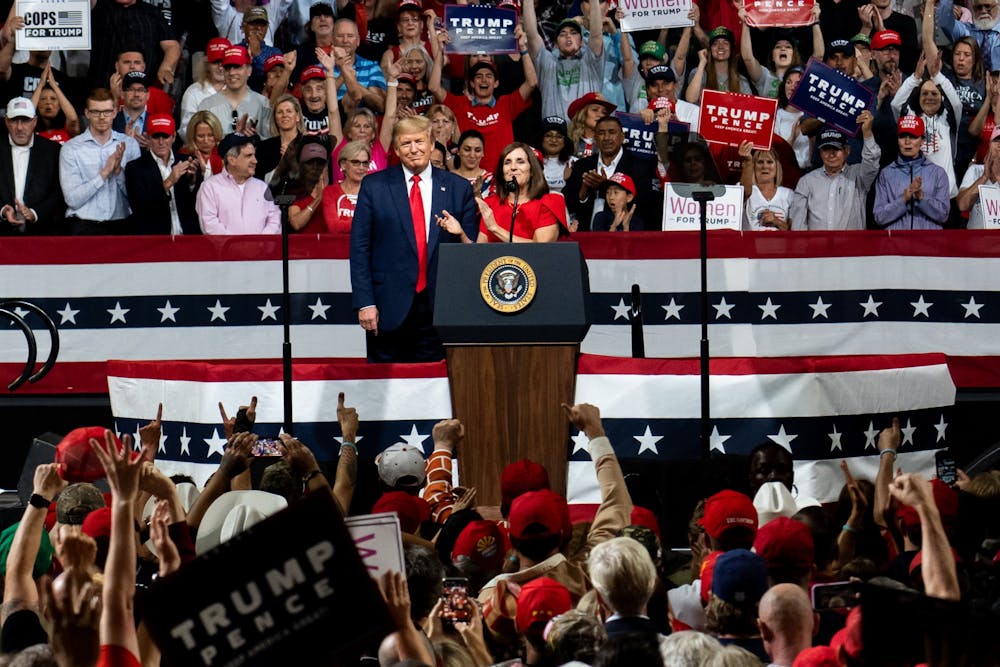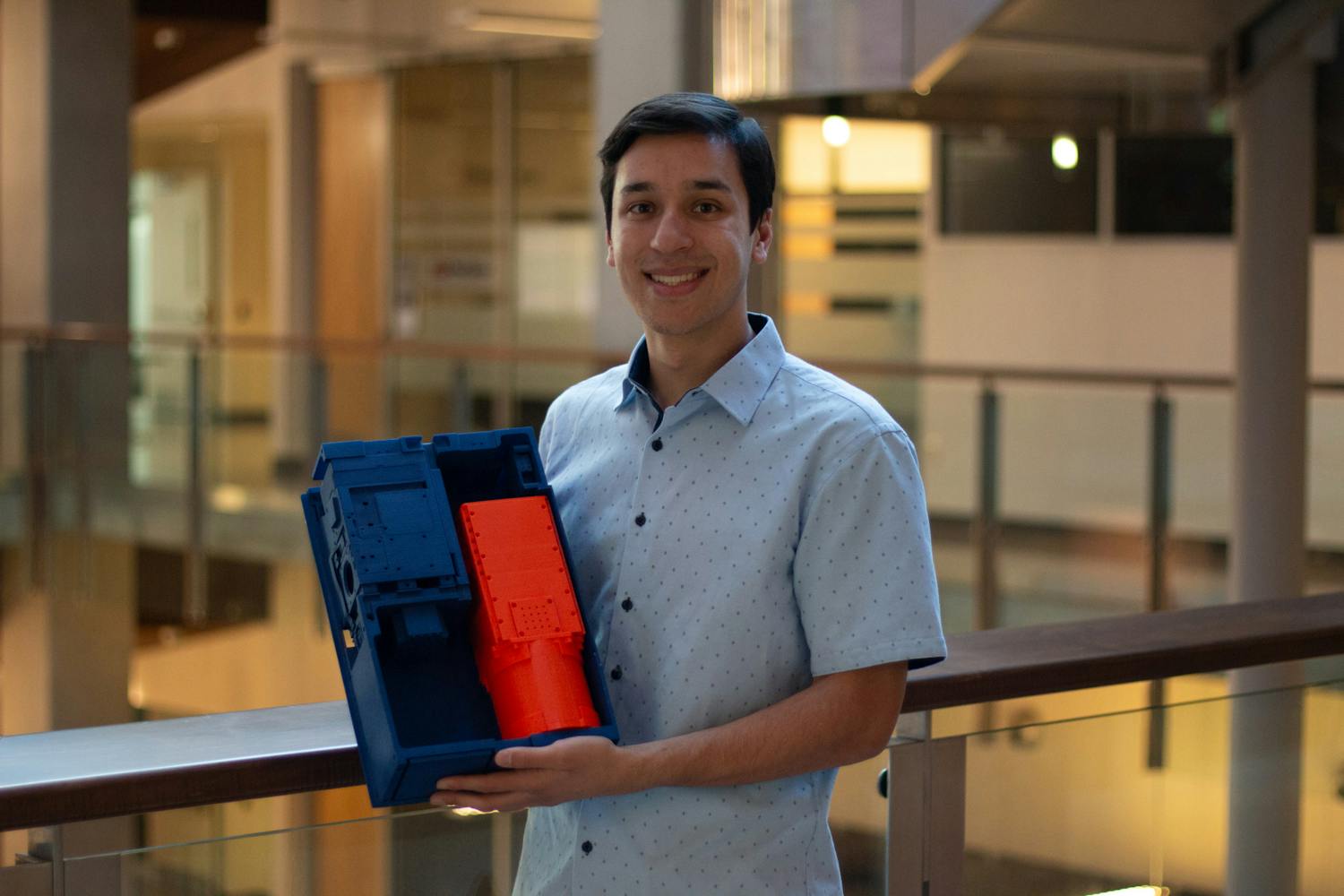Some Arizona voters are adjusting their mental and monetary focus to the state's Senate race after Tuesday's presidential debate proved to be an uncivil and unproductive airing of personal attacks over policy differences.
The race between incumbent Republican Sen. Martha McSally and Democratic challenger Mark Kelly could very well change the political construction and future of the Senate, and voters are taking notice of the role of the local race’s influence on policy nationwide.
McSally and Kelly are set to debate Tuesday, Oct. 6. The event will be hosted by the Arizona Clean Elections Commission and moderated by several Arizona media outlets.
Topics of the Senate debate will be similar to those at the presidential debate: Candidates are expected to discuss health care, the U.S. Supreme Court, COVID-19 and the economy.
Republicans are defending a three-seat lead in the Senate and if McSally can win, Republicans may be able to go into the next Congressional session with enough votes to pass or block legislation on health care, immigration reform and another coronavirus economic relief package.
McSally is a staunch supporter of President Donald Trump, having spoken at several of his events. She has sponsored a number of bills including the United States-Mexico-Canada trade agreement and protections for Southwest water sources after being appointed to the Senate in 2019 by Gov. Doug Ducey.
Kelly endorsed former Vice President Joe Biden in May, is a retired astronaut and is several points ahead of McSally in a number of polls. Kelly does not have previous government experience but is married to former Rep. Gabby Giffords, a Democrat, who represented Arizona's eighth congressional district for five years.
President Trump insulted and attacked Biden during the first presidential debate Tuesday, a theme the Commission on Presidential Debates and Arizona Federation of College Republicans Chairman Judah Waxelbaum are not predicting will continue.
Waxelbaum, a senior studying political science, said he's not sure the presidential debate shifted anyone's opinions about the candidates.
"Whichever candidate you supported before this, you're going to still support them," Waxelbaum said. "I personally think we've moved past presidential debates in the modern political realm."
Changes to come for debate procedure, but not to voters' decisions
Following the debate, the Commission on Presidential Debates said Wednesday both candidates and the moderator "made clear that additional structure should be added to the format of the remaining debates to ensure a more orderly discussion of the issues."
The commission said it would consider changing the format of the next two debates, including giving the moderator the ability to cut microphones to prevent interruption of either candidate.
President of Young Democrats of Arizona and an NAU senior studying political science and criminology Calli Jones said she thought the presidential debate was "chaos."
Jones said what makes local races different is a hyper fixation on niche communities, and not broad strokes about policy.
More than 73 million people watched the presidential debate Tuesday, 11 million less than the 2016 presidential debates featuring Trump and Hillary Clinton, which was the most watched presidential debate ever.
Jones said she wasn't able to vote in the 2016 election and has had her mind made up about casting a vote for a long time.
"I think a lot of people are tuning in to see the way in which both candidates carry themselves," Jones said. "I think everyone knows the rhetoric of the candidates. The way in which they answer the questions, regardless of the talking point, can tell us that they had a better plan than the other person."
Prior to the presidential debate, the Arizona Democratic Party Chair Felecia Rotellini said in a statement that voters were "looking for moral leadership and common-sense solutions to our most pressing issues."
The presidential debate talking points and where McSally and Kelly stand
During the presidential debate, Trump said "elections have consequences. We (the Republican Party) have the Senate, we have the White House, and we have a phenomenal nominee respected by all."
McSally is supportive of passing Judge Amy Coney Barrett's confirmation and said it was the president's duty to nominate judges, not wait for an election. In a statement, McSally wrote that Barrett's position as a working woman with children was unprecedented and would break barriers.
Kelly criticized McSally's statement and said the process before an election was too fast for a lifetime position. A statement from the Kelly campaign said upon Barrett's confirmation, affordable health care would be gutted.
Waxelbaum said all the issues up for debate between the two are particularly interesting to voters because of relevance to current events and setting up the future for Arizonans.
"The biggest difference between the two candidates is one has a voting record and the other doesn't," Waxelbaum said. "This is the United States Senate, you don't just figure it out when you get there."
Jones said she isn't worried about Kelly's lack of a political record. On Tuesday, she wants to hear the Senate candidates talk about voting rights, health care for women and the mistreatment of marginalized communities that have been left "unaddressed," she said.
"They need to deal with the problems that Arizona faces because even the Senate deals with more than the presidential race," Jones said.
When discussing the coronavirus during the debate, Trump and Biden bickered back and forth about the national effort to mitigate the spread and distribute personal protective equipment. Biden said the national response was not enough and the suffering of the American people without concern should raise red flags.
Kelly and McSally have stayed with party lines on the coronavirus response and criticism of plans and their impacts. Both have strong opinions on how to repair the economy and how to afford all Arizonans health care.
McSally has made several attempts to tie herself to what is considered to be a bipartisan policy, such as insurance protections for Americans with pre-existing conditions, but still wants to see cuts to the Affordable Care Act. Kelly's campaign has highlighted her positions, and Waxelbaum believes it could be a deciding factor in who wins the election.
Waxelbaum also said he does not believe Arizonans will be tight-lipped on who they support. Jones and Waxelbaum both said Arizonans and students in their organizations want genuine candidates who care about the policies that will change the lives of real people.
"Most Arizona voters want someone that directly reflects their experiences in the world," Jones said. "They want a connection with who represents them in D.C."
Reach the reporter at pjhanse1@asu.edu and follow @piperjhansen on Twitter.
Like The State Press on Facebook and follow @statepress on Twitter.

Piper Hansen is the digital editor-in-chief at The State Press, overseeing all digital content. Joining SP in Spring 2020, she has covered student government, housing and COVID-19. She has previously written about state politics for The Arizona Republic and the Arizona Capitol Times and covers social justice for Cronkite News.




